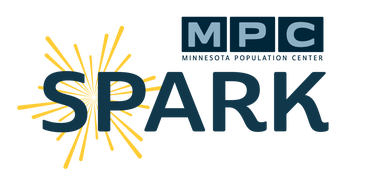
With funding from the Population Dynamics Branch of the Eunice Kennedy Shriver National Institute for Child Health and Human Development, the Minnesota Population Center (MPC; P2CHD041023) is seeking applications for “Spark Grants.” Spark Grants are up to $20,000 grants for MPC members with research needs that have the potential to turn into larger, externally funded projects or to produce impactful research results. Spark Grants can fund time-sensitive research opportunities, new interdisciplinary research collaborations, or support the seeding of impactful interdisciplinary research questions. They can fund a swift collection or analysis of timely data. Appropriate use of funds can include, but is not limited to: investigators' salaries or research assistant time. Priority will go to (1) New and Early Stage Investigators and individuals from underrepresented groups and (2) new interdisciplinary teams.
Spark Grants will be made in two ways:
- Open Call: Any MPC Faculty or Staff Member or team of members can submit a proposal in response to a timely or urgent opportunity. Proposals may include collaborators who are not MPC members if they bring relevant expertise to the proposed project.
- Targeted Opportunity: We will put out specific calls for proposals should a time-sensitive opportunity arise (e.g., a special NIH RFA or a public health crisis) to which MPC would like to lead a response. Special solicitations will be announced in a direct email to members as well as sent via targeted emails to members with especially relevant expertise.
Eligibility:
All active MPC research staff and faculty members are eligible. The proposed research must be clearly relevant to the NICHD PDB mission. Preference will be given to NESIs and to investigators from historically underrepresented backgrounds. We will consider applications from more senior MPC members if they meet two criteria: (1) they do not have other available research funds and (2) they are bringing together a new, interdisciplinary team. Individuals may not receive more than one Spark Grant per fiscal year. Outcomes from previous Spark Grants will be an additional review criteria for subsequent applications.
Application Process:
As these grants are meant to be timely, the application process is designed to be unburdensome. We require (1) a 1000-character (about 200-word- includes spaces) statement of the problem to be addressed or the hypothesis to be tested and why it is time sensitive; (2) a 2000-character (about 400-word - includes spaces) proposal, including significance, specific aims, and plan of work; (3) a 1000-character (about 200-word - includes spaces) statement of anticipated outcomes or deliverables; (4) a short statement about the relevance of the work to PDB’s mission; (5) a NIH biosketch for all key investigators (up to three); (6) whether the proposed research qualifies as human subjects with an explanation of why it does not, if appropriate; (7) a brief budget narrative; (8) a statement about the availability of other funds and support for the project; and (9) a statement about Administrative or Scientific /Technical resources required.
Applications should be submitted using this form.
Review Process and Criteria:
We will accept proposals on a quarterly basis. The deadlines are March 15th, June 15th, September 15th, and December 15th. A subcommittee of the MPC Advisory Board, the MPC Development Core Co-Leads, and the MPC Director will be responsible for review. Decisions will be made within ten business days from the date of the closest quarterly deadline.
Applications will be reviewed on the following criteria: (1) Is the proposed project time sensitive? (2) Does the proposed project promise to advance research in an MPC Primary Research Area (PRA) or another area within the PDB mission? (3) Does the proposed project have the potential to lead to an externally funded research project or to rapid publication on a time-sensitive issue? (4) Is the investigator a NESI and/or self-identified from a historically underrepresented background? (5) Does the investigator have other funds available to conduct this research? (6) Is the proposed budget consistent with the scope of the work proposed?
MPC Development Core Co-Lead Claire Kamp Dush, kampdush@umn.edu is available to discuss proposed projects and provide feedback and help in crafting proposals to ensure that applications, at minimum, meet the review criteria.
Anticipated Outcomes:
Spark Grant recipients will be strongly encouraged to work with the Development Core on their subsequent grant applications and will be eligible for internal and external proposal review, as time allows. Other anticipated outcomes include timely publications, especially in Demography or in venues with the potential to shape public policy or health policy. All award recipients will be strongly encouraged to present the results of their funded project at the Minnesota Demography and Aging Seminar Series.
Recipients:
"Studying the Relationship of School Segregation and Life Outcomes in Minnesota" - Myron Orfield
"Professional Football Players & Mortality Consequences Over Time: Position, Participation, and Race" - Michael Esposito
"Loneliness as a Key Mechanism Underlying Suicide Risk Among Young Adults" - Alexandra VanBergen
"Understanding the Negative Repercussions of Anti-Critical Race Theory in Schools on Adolescent Development and Substance Abuse" - Juan Del Toro
"Heterogeneity in Underage Drinking Problems among Hispanic Adolescents: Understanding Neurobiological and Sociocultural Determinants" - Ka I Ip
"Improving Prevention of Mother to Child Transmission of HIV Through Simulation Modeling" - Horacio Duarte
"School start time policy and mental health - piloting procedures" - Rachel Widome
* Early State Investigator = "A Program Director / Principal Investigator (PD/PI) who has completed their terminal research degree or end of post-graduate clinical training, whichever date is later, within the past 10 years and who has not previously competed successfully as PD/PI for a substantial NIH independent research award. See our list of NIH grants that PD/PI can hold and still be considered an ESI.
* New Investigator = An investigator who has not previously competed successfully for substantial, independent funding from NIH.
View the CFP as a PDF File.